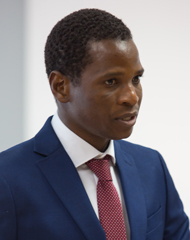“Los Estados deben tomar en serio los derechos humanos de las migraciones y legislar para una gestión común a nivel de la ONU”
El doctorando del ICS Ernest Thera, originario de Mali, ha comparado en su tesis el asilo, la entrada, la residencia, la permanencia y la integración de los migrantes en Francia y España

FOTO: Manuel Castells
El asilo, la entrada (regular e irregular), la residencia, la permanencia y la integración de los inmigrantes en Francia y España ha sido objeto de estudio de una tesis realizada en el Instituto Cultura y Sociedad (ICS) de la Universidad de Navarra y defendida en la Facultad de Derecho. Su autor, Ernest Thera -originario de Mali-, ha contado con la dirección de Caridad Velarde.
El nuevo doctor asegura que el trabajo “incita a los Estados a tomar en serio los derechos humanos de las migraciones y también legislar para una gestión común a nivel de la ONU, ya que las migraciones son un fenómeno global en un mundo global y exceden la soberanía nacional de los Estados”.
Explica que, en definitiva, la tesis “busca fomentar el respeto de los derechos de los inmigrantes y su integración en la sociedad de acogida, que es lo que permitirá la cohesión social en dichas sociedades cada vez más pluriculturales”.
Esta comparación de la normativa jurídica internacional, constitucional e infraconstitucional de Francia y España en torno al ius migrandi (derecho de las migraciones) ha girado en torno a dos ejes. El primero es el derecho de asilo, entrada, residencia y permanencia, cuestiones “en las que estos dos países tienen mucho en común”, comenta Thera.
Añade que en el asilo se da mayor nivel de regulación y consenso internacional y europeo, tanto en lo convencional como en la costumbre. “Ha sido incorporado en la costumbre internacional desde la Edad antigua y se reconoce a nivel internacional convencional a través el Convenio de Ginebra de 1951 y su Protocolo de 1967”, apostilla.
Crisis de los refugiadosPor otro lado, indica que el asilo ha sido europeizado a través el Convenio Dublín que permite a los Estados miembros tratar las demandas de manera conjunta y la gestión común de los flujos masivos de asilo y la situación prolongada de los refugiados. “Pero las crisis de refugiados de 2015 y 2016 demostró la debilidad de los Estados en su capacidad de hacer frente a los flujos. No supieron repartirse responsabilidades de forma eficaz y equitativa”, recalca.
El asilo se reconoce también -según apunta- en el derecho constitucional de España y Francia y los dos países tienen mecanismos para permitir a los demandantes recurrir una decisión negativa de asilo (el derecho a un recurso efectivo).
“También hemos concluido -subraya- que los menores no acompañados son el colectivo con mayor protección tanto en el caso de los refugiados como en el de los migrantes”. Considera que la mayor dificultad en este caso es la determinación de la minoría de edad: “En España y Francia se prevé la posibilidad de realizar pruebas complementarias; la decisión en España no puede recurrirse, lo que representa riesgo de vulneración del derecho del menor a ser admitido”.
En lo que respecta a la residencia, Ernest Thera sostiene que “salvo el derecho de voto y a ser elegido para cargos políticos electivos, los inmigrantes en situación regular son susceptibles de ser titulares de los mismos derechos que los demás ciudadanos de la nación”.
Los inmigrantes en situación irregular, sin embargo, son -de acuerdo con Thera- los colectivos más desprotegidos en los países de acogida. “Pero son titulares de derechos humanos como ‘seres humanos’ y los países de acogida les deben tratar como tales”, remarca.
Inserción intercultural, alternativa de integraciónEn el segundo eje de la tesis se encuentra la integración de los extranjeros. El nuevo doctor ha comprobado que a este respecto hay una gran distinción entre los dos países estudiados: “Francia ha desarrollado en un sistema asimilacionista, que acepta solo los valores de la república en el ámbito público y reserva la expresión de cuestiones religiosas y culturales en el ámbito privado”.
A su juicio, no puede hablarse de un sistema de integración definido en esta nación, pero “se aprecia una tendencia a la integración intercultural que recoge los principios básicos de ciudadanía e integración”.
Ernest Thera asevera que la inserción intercultural es el modo de integración que se está fomentando en Europa “porque se percibe como alternativa a los sistemas de asimilación, multiculturalismo... que, como se ha visto, han fracasado. Por tanto, se fomenta la integración intercultural a todos los niveles de toma de decisiones de los Estados”. No obstante, advierte de que una mala aplicación “puede producir los mismos conflictos que produce el sistema asimilacionista”.





